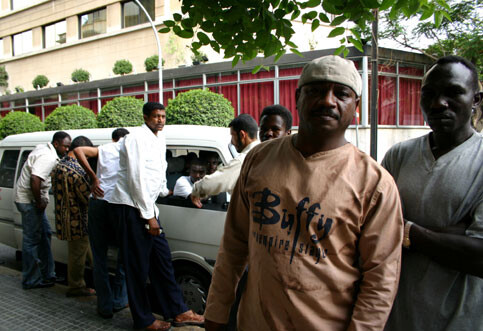IRIN 22 July 2006

Sudanese workers in Beirut prepare for the dangerous drive to Syria from where they will fly to Khartoum. (Hugh Macleod/IRIN)
BEIRUT - Roughly 22,000 refugees and asylum seekers are stranded in Lebanon - mainly from Iraq, Sudan and Somalia - and UN refugee agency UNHCR is increasingly concerned for their safety.
“There has been a demonstration outside our office in Beirut by some of these frightened people, including stranded migrant workers, asking us to put them on a boat to Cyprus to safety,” said Ekber Menemencioglu, UNHCR’s director for the region.
“We are helping with their immediate needs by directing and taking them to shelters, where they can get a roof over their heads and food packages,” he added.
Yasser Saadi, a watchmaker from Baghdad, left Iraq five years ago to work on a Beirut construction site, sending money home to his family every month. After two and a half years lifting concrete he opened a small watch repair shop in the Lebanese capital, which he is now reluctant to leave.
“We can’t go back to Iraq and the situation here is getting so bad that even the Lebanese are leaving. I wish I could travel to Europe where I could be safe and I could just live my life,” said the young man, waiting on the street with his belongings.
Saadi was heading to Syria, 60 km from Beirut, to escape the bombing by Israeli warplanes, which started on 12 July, in retaliation for the capture of two of its soldiers by Hizbullah militants. The Iraqi embassy in Beirut had told him that he would only be allowed to stay in Syria for 48 hours and then would then have to return to Baghdad. But Saadi says he doesn’t know what he’s going to do as sectarian violence continues in in Iraq.
An official in the Iraqi embassy said 3,000 Iraqis were officially registered in Lebanon, but estimated the real number was closer to 21,000. So far 250 Iraqis have left the country, with 100 more expected to go tomorrow. The official said the Lebanese authorities were allowing Iraqis without official papers to cross the border into Syria.
By a Beirut roadside, a group of Sudanese workers crammed into a minibus were also preparing to make the dangerous journey to the Syrian capital, Damascus, from where their embassy had chartered a plane to fly them back to Khartoum.
“We’re not comfortable, there is no safety. We all came here to work - we used to be able to send back $100 a month to our families. If we go back to Sudan we earn only what we can eat and drink,” said Mohammed Farouk, who said he had been released from prison last week after the authorities granted an amnesty to all minor offenders nearing the end of their sentence.
Farouk estimated a few thousand Sudanese, who worked as labourers, caretakers and cleaners, had already left Lebanon.
Related Links
This item comes to you via IRIN, a UN humanitarian news and information service, but may not necessarily reflect the views of the United Nations or its agencies. All IRIN material may be reposted or reprinted free-of-charge; refer to the copyright page for conditions of use. IRIN is a project of the UN Office for the Coordination of Humanitarian Affairs.